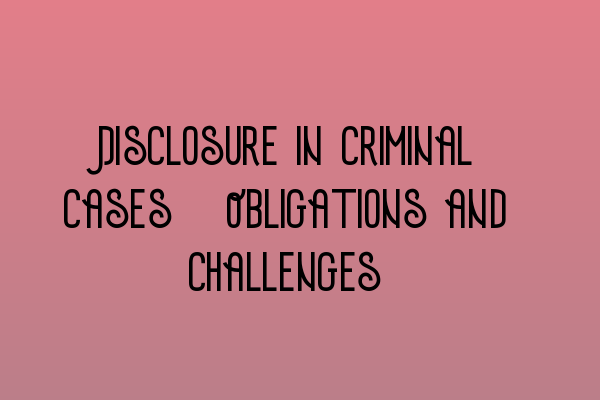Disclosure in Criminal Cases: Obligations and Challenges
In criminal cases, the concept of disclosure plays a vital role in ensuring a fair trial and balanced adversarial system. It involves the duty of the prosecution to disclose all relevant evidential material to the defense. Let’s explore the obligations and challenges surrounding disclosure in criminal cases.
Obligations of Disclosure
The obligations of disclosure primarily rest with the prosecution. It is their duty to disclose all material that is in their possession, custody, or control and which is considered relevant to the case. This includes both incriminating and exculpatory evidence.
Failure to disclose material evidence can significantly impact the defendant’s right to a fair trial. Therefore, the prosecution must ensure that all relevant information is provided to the defense in a timely manner. This allows the defense to prepare their case effectively and challenge the prosecution’s evidence.
However, disclosure is not limited to the prosecution alone. The defense also has an obligation to disclose any material that they intend to rely upon, including any expert reports or witness statements they may have.
Challenges in Disclosure
Although disclosure is a fundamental aspect of the criminal justice system, it can often present various challenges. These challenges arise due to the sheer volume of evidence involved, issues of relevance, and sometimes intentional withholding of evidence by the prosecution.
One common challenge is the existence of unused material. Unused material refers to the evidence that is not directly relevant to the case but may be relevant to the credibility of a witness or any other aspect of the investigation. The prosecution is required to disclose unused material that meets a certain threshold of relevance. However, determining what constitutes relevant unused material can be subjective, leading to disputes between the prosecution and the defense.
In a technologically advanced world, the vast amount of digital evidence poses another challenge. With the increasing reliance on electronic communications and storage devices, it becomes crucial for the prosecution to effectively manage and disclose digital evidence. This includes providing copies of emails, text messages, and any other relevant digital material.
The challenge is intensified when dealing with complex cases involving multiple defendants, extensive evidence, or sensitive material. This requires careful handling and identification of relevant information to ensure a fair and just process.
Conclusion
Disclosure is an essential component of any criminal case, ensuring fairness and upholding the right to a fair trial. The obligations of disclosure fall upon both the prosecution and the defense. However, challenges in disclosing evidence can arise due to the volume of evidence, issues of relevance, and technological complexities.
At SQE Criminal Law & Practice Law UK, we understand the importance of disclosure in criminal cases. Our team of expert solicitors is well-versed in the obligations and challenges surrounding disclosure, ensuring a robust defense for our clients. For more information about criminal law practice and preparation, check out our related articles:
- SQE 1 Practice Exam Questions
- SQE 1 Practice Mocks FLK1 FLK2
- SQE 2 Preparation Courses
- SQE 1 Preparation Courses
- SRA SQE Exam Dates
Feel free to contact us at SQE Criminal Law & Practice Law UK for expert legal advice and guidance in criminal cases.
